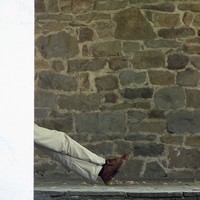Research Interests:
Research Interests:
This article enquires into the origins of the historiographical notion of double truth, a prominent and controversial category in the modern study of medieval philosophy. I believe that these origins are to be found in a short text by... more
This article enquires into the origins of the historiographical notion of double truth, a prominent and controversial category in the modern study of medieval philosophy. I believe that these origins are to be found in a short text by Jacob Thomasius from 1663, entitled De duplici & contradictoria veritate, which stands as a very early and highly original example of a history of double truth. I propose a detailed analysis of this document in order to shed light on the mechanisms that transformed duplex veritas from a keyword in Thomasius’s Protestant milieu into a historiographical category. As I show, the De duplici & contradictoria veritate provides a historical legitimation of Thomasius’s own brand of Lutheran Aristotelianism. It does so in a highly ambiguous fashion, namely by bringing together the Lutheran theologian and proponent of double truth Daniel Hofmann with anonymous medieval “Averroists”. I venture an explanation for Thomasius’s line of action by uncovering two of his implicit sources.
Research Interests:
This article analyzes the entry on Andrea Cesalpino, an Italian thinker from the second half of the sixteenth century, in Pierre Bayle’s Dictionnaire historique et critique. I investigate how and why Bayle was able to portray Cesalpino as... more
This article analyzes the entry on Andrea Cesalpino, an Italian thinker from the second half of the sixteenth century, in Pierre Bayle’s Dictionnaire historique et critique. I investigate how and why Bayle was able to portray Cesalpino as both an authentic follower of Aristotle and a forerunner of Spinoza’s heterodox teachings. As I show, Bayle integrated two different and even conflicting threads of the reception Cesalpino enjoyed in the late sixteenth and early seventeenth centuries. The background which rendered Bayle’s synthesis possible turns out to be contemporary Cartesian polemics against both Spinoza and Aristotle.
Research Interests:
This article sheds new light on the complex relationship between Jacob Thomasius’s main occupation as a professor of Aristotelian philosophy at the Lutheran University of Leipzig and his works on the history of philosophy, which showed... more
This article sheds new light on the complex relationship between Jacob Thomasius’s main occupation as a professor of Aristotelian philosophy at the Lutheran University of Leipzig and his works on the history of philosophy, which showed the incompatibility of Aristotle with central Christian doctrines. I argue for a strong inner consistency between these two seemingly conflicting aspects of Thomasius’s intellectual activity. Far from paralyzing his way of doing ‘Christian Peripatetic philosophy,’ the history of philosophy was for Thomasius an indispensable analytical tool for reforming Aristotelianism. To illustrate my thesis, I investigate the way Thomasius used his historical reconstruction of Aristotle’s theory of intellect to intervene in a contemporary debate on the origin of the human soul, a debate which played a central role in the crystallization of a Lutheran confessional identity.
Research Interests:
»Quo pacto ex philosophis interpretes Aristotelis facti sunt?« Die genuinen Peripatetiker der Frühen Neuzeit in Jacob Bruckers Historia critica philosophiae, in: Language and Method. Historical and Historiographical Reflections on Medieval Thought, ed. by U. Zahnd, Freiburg i.Br., 2017, pp. 281–307more
This article proposes an analysis of the notion of “genuine Aristotelianism” in Jacob Brucker’s influential Historia critica philosophiae (1742–1744). This category proves particularly interesting since genuine Aristotelians were for... more
This article proposes an analysis of the notion of “genuine Aristotelianism” in Jacob Brucker’s influential Historia critica philosophiae (1742–1744). This category proves particularly interesting since genuine Aristotelians were for Brucker not only an historiographical object but also a lens through which he examined his objects. Brucker applied the label to a number of early modern Italian and German thinkers who had allegedly restored the “genuine” Aristotle, disfigured by medieval scholastics. Yet, as I show, the fact that Brucker recognized the philological skill of early modern Aristotelians does not mean that he rated them very highly. On the contrary, this category helped him argue for the superiority of modern reason over the Aristotelian tradition as a whole. On the narrative level of the Historia critica, genuine Aristotelians were reduced to mere interpreters of Aristotle. They embodied the antithesis to Brucker’s ideal of the modern philosopher as an independent thinker. On the methodological level, genuine Aristotelians figured as excellent interpreters but only in as far as they vouched for Brucker’s own reconstruction of Aristotle’s “errors”.
